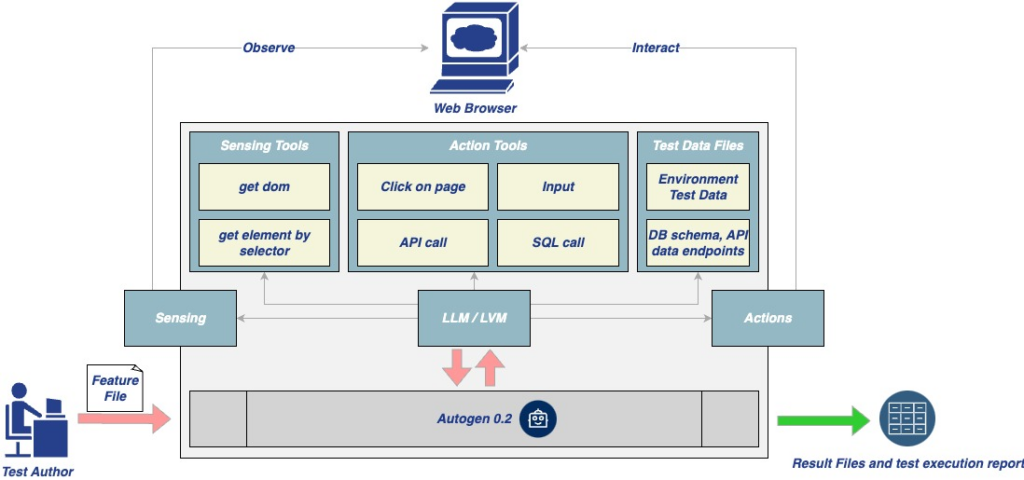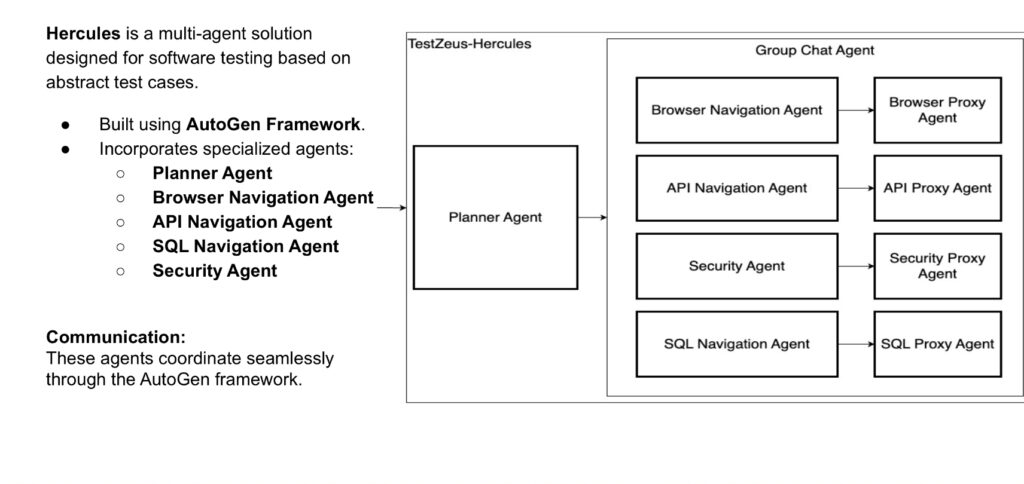We ❤️ Open Source
A community education resource
Unveiling Hercules: Building multiagent systems for intelligent test automation
Use this step-by-step guide to design your own multiagent system.

When we started building Hercules, we aimed to solve a growing problem in software testing: How to test complex systems efficiently and intelligently. The result is an open source platform powered by multiagent architecture that brings distributed intelligence to end-to-end testing workflows.
In this blog, we’ll explore the architecture of Hercules, break down its components, and provide actionable insights for developers interested in building similar systems.
Why multiagent?
Traditional testing tools often follow a monolithic design: A single entity responsible for all tasks, from running tests to reporting results. While functional for smaller systems, these designs struggle with scalability, adaptability, and resilience when faced with modern, complex software ecosystems.
Multiagent architecture addresses these limitations by dividing responsibilities across specialized agents that collaborate to complete tasks. Each agent focuses on a specific domain, such as API testing or UI automation, working in harmony with others to achieve a common goal.
Read more: Best practices from Selenium and developer communities

The multiagent architecture of Hercules
At its core, Hercules is built around three main concepts: Specialized agents, shared memory, and modular tools. Let’s break this down.
1. Specialized agents
Hercules operates with distinct agents, each designed to handle specific tasks. This modularity ensures focus, efficiency, and scalability.
- API navigation agent: Handles REST and GraphQL API calls, validating responses, and ensuring consistency.
- Browser navigation agent: Executes UI workflows, simulating user interactions like form submissions or navigation.
- High-level planner agent: Acts as the coordinator, breaking down tasks into actionable steps and assigning them to the appropriate agents.
By delegating responsibilities, Hercules achieves parallelism, reducing testing time while increasing reliability.
2. Shared memory
Memory management is critical in a multiagent system. Hercules uses two types of memory:
- Short-term memory (STM): Maintains the immediate context required for the current task. For example, STM might hold specific test case details while a browser agent executes a workflow.
- Long-term memory (LTM): Stores reusable information, such as test results, reusable patterns, or learned configurations. This ensures that agents don’t repeat the same steps unnecessarily.
Benefit: By centralizing memory, Hercules allows agents to share knowledge seamlessly, enhancing collaboration and reducing redundant effort.
3. Modular tools
Agents rely on an array of tools for their tasks. These tools are modular, allowing easy customization and extension:
- Playwright manager: For browser automation.
- Captcha solver: To handle automated CAPTCHA challenges.
- PDF text extractor: For scenarios involving PDF parsing and validation.
This modularity ensures that Hercules remains flexible and adaptable to a variety of testing requirements.
4. Runner module
The runner.py script is the entry point and orchestration layer for Hercules. It initializes agents, manages execution, and consolidates results. Think of it as the “main function” that ties the system together, ensuring every component operates in sync.
How to build your own multiagent system
Inspired by Hercules? Here’s a step-by-step guide to designing your own multiagent system:
Step 1: Define your agents
Start by identifying the tasks your system needs to handle. For instance:
- An API Agent could handle backend interactions.
- A UI Agent could test workflows and validate front-end functionality.
Ensure each agent has a focused and well-defined scope.
Step 2: Design communication
Agents need a way to share information. In Hercules, this is achieved through shared memory. You can also explore other patterns like:
- Message queues (e.g., RabbitMQ, Kafka): For asynchronous communication.
- RESTful APIs: For loosely coupled systems.
Step 3: Choose the right tools
Equip your agents with libraries and frameworks that match their tasks:
- Use Playwright or Selenium for browser automation.
- Use Requests or HTTPX for API interactions.
- Integrate domain-specific libraries as needed.
Step 4: Implement memory management
Build memory modules to store context and history. Start with:
- In-memory stores (e.g., Redis): For short-term memory.
- Persistent databases (e.g., PostgreSQL): For long-term storage.
Design efficient mechanisms for memory retrieval and updates to avoid bottlenecks.
Step 5: Monitor and optimize
Build logging and monitoring into your system. Hercules logs every agent interaction, enabling detailed debugging and performance optimization.

Why open source matters
By making Hercules open source, we aim to empower developers and organizations to adapt, extend, and contribute. Multiagent systems have applications far beyond testing—ranging from automation to data pipelines and beyond. Open source fosters innovation, and Hercules serves as a foundation for building intelligent, distributed systems.
Final thoughts
Hercules showcases the power of multiagent architecture in solving complex software testing challenges. By leveraging specialized agents, shared memory, and modular tools, it delivers scalability, efficiency, and resilience.
If you’re an engineer or developer exploring AI-driven automation, multiagent systems like Hercules can be a game-changer. The Hercules codebase is ready for you—clone it, learn from it, and build your own intelligent agents.
Explore Hercules on GitHub and join our community to shape the future of software testing!
More from We Love Open Source
- Getting started with Llamafile tutorial
- Best practices from Selenium and developer communities
- How Netflix uses an innovative approach to technical debt
- Evolving DevOps with productivity and improving the developer experience
- Best practices and tips for developers to integrate AI tools into their workflows
The opinions expressed on this website are those of each author, not of the author's employer or All Things Open/We Love Open Source.
